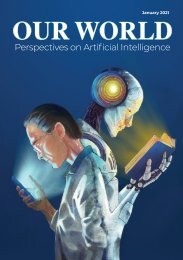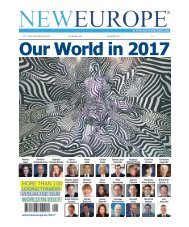Our World in 2018
Leading minds reflect on the state of our societies, and examine the challenges that lie ahead. An edition dedicated to generating ideas that will help form a new vision for our world.
Leading minds reflect on the state of our societies, and examine the challenges that lie ahead. An edition dedicated to generating ideas that will help form a new vision for our world.
You also want an ePaper? Increase the reach of your titles
YUMPU automatically turns print PDFs into web optimized ePapers that Google loves.
SCIENCE & TECHNOLOGY
How IT Threatens
Democracy
By Kofi A. Annan
The Internet and social media
were once hailed for creating new
opportunities to spread democracy
and freedom. And Twitter, Facebook, and
other social media did indeed play a key role
in popular uprisings in Iran in 2009, in the
Arab world in 2011, and in Ukraine in 2013-
2014. Back then, the tweet did at times seem
mightier than the sword.
But authoritarian regimes soon began
cracking down on Internet freedom. They
feared the brave new digital world, because
it was beyond the reach of their analogue
security establishments. Their fears proved
unfounded. In the event, most social mediaenabled
popular uprisings failed for want of
and military organizations retained the
upper hand.
In fact, these regimes have begun to
wield social media for their own ends. We
have all heard the allegations that Russia
covertly used social media to influence
electoral outcomes in Ukraine, France,
Germany, and, most famously, in the United
States. Facebook has estimated that Russian
content on its network, including posts and
paid ads, reached 126 million Americans,
around 40% of the nation’s population.
We should recall earlier accusations
by Russia of the West’s role in fomenting
the “color revolutions” in Ukraine and
Georgia. The Internet and social media
surreptitious manipulation of public opinion.
If even the most technologically advanced
countries cannot protect the integrity of
the electoral process, one can imagine the
challenges facing countries with less knowhow.
In other words, the threat is global.
In the absence of facts and data, the mere
Kofi A. Annan
KA.A
CK
Annan Foundation,
and former
Secretary General of
the United Nations.
possibility of manipulation fuels conspiracy
theories and undermines faith in democracy
and elections at a time when public trust is
already low.
Social media’s ideological “echo
chambers” exacerbate people’s natural
biases and diminish opportunities for
healthy debate.
This has real-world effects, because it
fosters political polarization and erodes
leaders’ capacity to forge compromises, the
basis of democratic stability. Likewise, the
hate speech, terrorist appeals, and racial
and sexual harassment that have found a
home on the Internet can lead to real-world
violence.
But social media are hardly the first
communication revolution to challenge
political systems. The printing press, radio,
and television were all revolutionary in their
day. And all were gradually regulated, even in
the most liberal democracies. We must now
consider how to submit social media to the
same rules of transparency, accountability,
and taxation as conventional media.
In the US, a group of senators has
introduced the “Honest Ads Act,” which
would extend the rules that apply to print,
radio, and television to social media. They
hope it will become law before the 2018
midterm election. In Germany, a new law,
the Netzwerkdurchsetzungsgesetz, requires
social-media companies to remove hate
speech and fake news within 24 hours or
.
As useful as these measures may be, I am
not sure that national laws will be adequate
to regulate online political activity. Many
poorer countries will not be able to put up
such resistance, and enforcement will be
data are stored and managed outside the
regulating country.
Whether or not new international
norms are necessary, we should
be careful that in seeking to curb
the excesses, we do not jeopardize the
fundamental right to freedom of expression.
Indeed, open societies should not over-react,
lest they undermine the very freedoms on
72 2018 | OUR WORLD










